As the old proverb goes, “Manners maketh the man.” Some live by this mantra, whereas others clearly don’t.
This was brought into sharp focus recently when I entered into correspondence with a writer whose article I had edited. As the piece was batted between us, with requests for me to alter this and add that, two things were conspicuous by their absence: “please” and “thank you.” While this sorry state of affairs continued, I became increasingly irked by the lack of appreciation being shown to me, both on a personal and professional level.
How hard would it have been to extend this basic courtesy, I thought to myself. I was even tempted to reply to one of the emails with the single word “PLEASE!”
Of course, I didn’t raise the issue with my correspondent, who in fairness, lifted my mood slightly by thanking me at the end when the job was done. But the whole episode left me with a rather sour taste.
What’s the magic word?
When I was little, the rhetorical question, “What’s the magic word?” would always be asked, were I to commit the mortal sin of forgetting my manners. Consequently, “please” and “thank you” were among the first words that I gabbled as a toddler, and have always littered my lexicon, both in conversation and writing.

I always say please and thank you and try to be courteous – and expect no less of others.
Following my irksome exchange, I took to my favorite social media platform, Facebook, to ascertain the opinions of my virtual friends on the matter, and found them to be somewhat varied. For some, “ingrained politeness,” as one woman called it, was meaningless as it doesn’t guarantee respect; simply uttering the magic words doesn’t mean anything without it.
The majority, however, agreed with me. “It costs nothing to be polite,” said one. Good manners, something which, “comes from the home,” as another suggested, are paramount.
The overwhelming impression given by the comments was that uttering the words “please” and “thank you,” was important.
Failure to do so, according to Louise Stewart, an old school friend from Manchester is, “churlish and shows lack of appreciation for others around you. It costs nothing to be polite, even if you don’t really mean it,” she went on.
The same applies on the roads, to both drivers and pedestrians alike, it would seem. Consideration given to fellow drivers by letting them go in front of you, for example, should always be met with a brief wave or nod of the head.
Similarly, pedestrians would do well to acknowledge a driver who has stopped at a crossing to let them pass.
EXTENDING COURTESY through actions, words, and deeds, although not always remarked upon, is much appreciated.
The “conversation” then turned to Israel, where attitudes are somewhat different when it comes to this issue. One could be forgiven for thinking that many Israelis don’t regard manners as important.
While this may be construed as rudeness, for those who haven’t been brought up on a diet of social etiquette, (as have many Brits, for example) it’s not. For them, it’s not about saying “please” and “thank you,” as Robert Marks, a British-born Israeli who has lived in Netanya for decades explains:
“Having lived the majority of my life in Israel, the courtesy stuff is far less important. Israelis are tough on the outside but when you really get to know them and mix with them they really are warm, kind, and respectful. So no, they don’t usually say please, excuse me, etc. but when you need them, you will find them the most helpful lot on this planet. Give me an Israeli every time when in need.”
Alexa Raine, another British Israeli goes further, by explaining that it’s a cultural thing, and has nothing to do with rudeness: “Maybe it’s cultural. Hebrew is not a ‘polite’ language, it’s more direct. I used to teach Business English [in hi-tech companies] – this often came up in discussions. Anglos use far more qualifying terms and phrases and are more polite than native Israelis.”
While there is a generally held belief that Anglos, and Brits in particular, are more polite, not everyone agrees.
Elias (not his real name) says this, “Why have the English a reputation for good manners? They are rude, pushy, cannot speak anything other than English, and always think they are better than the rest?”
As if to prove his point, Dan Risler, a Londoner who recently moved to Israel recounted a story from his early working life: “Many years ago in my old firm, I held the door open once for one of the senior partners. He gruffly reacted: ‘I’m not bloody dead yet, you know!’”
Even though you can’t please all of the people all of the time, being courteous is something we should all strive toward. Whether it’s a nod or wave to a driver who stops to let you pass, or a simple “thanks” when someone hands you a drink in a café, these small gestures of appreciation never go unnoticed – and could even make someone’s day!’
The writer is a former lawyer from Manchester, England. She now lives in Israel where she works at The Jerusalem Post.
